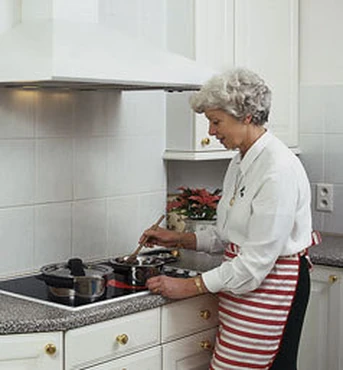Being safe inside the home should be an important concern for everybody, but especially for seniors.
According to statistics released by the National Center for Biotechnology Information, 29% of home accidents involve the toilet, 18% involve the sitting room, 14% happen in the kitchen, 11% happen in the bedroom and 10% occur in the dining room.
In addition, 75% of home accidents involved a fall, and the rest of the accidents had to do with seniors being injured by sharp objects (8%), ingesting foreign objects (6%), receiving a crush injury (4%), being burned or scalded (3%), having an object hit or fall on them (3%) and receiving an electric shock (1%).
Other injuries
Seniors are being injured in other ways too.
According to statistics released by BayAlarmMedical.com, 26% of seniors make potentially serious mistakes when taking their medication and 32% fall at least once a year. Moreover, 57% of them will fall again within the next 12 months.
 Senior Care Expert Dr. Marion Somers told a local news outlet that having safety rails around the home is a must for many seniors.
Senior Care Expert Dr. Marion Somers told a local news outlet that having safety rails around the home is a must for many seniors.
"Put safety rails, safety guards in the bathroom, the toilet, that whole area," she said.
In addition, Somers says there may be some government programs that could help with the cost of installing the guard rails, but not many of those programs exist. Fortunately, the cost of putting in guard rails shouldn't be that high, she says.
"There are some programs, but they're very limited," explained Somers. "Rails are a very inexpensive item to have. Go to the local store that sells those things, and have them installed properly by somebody who knows how to install it. Otherwise, they kind of glue it to the wall and that makes it absolutely useless."
Staying in shape
Seniors should exercise regularly to diminish the risk of falling, experts say. And while exercising, they should put emphasis on building leg strength and balance.
According to SeniorsAtHome.org, seniors should remove all rugs and runners from the floor to prevent slips or trips, and each room should be kept brightly lit.
Plus, it's smart to remove any phone chords or electrical wires from pathways or those places in the home where there's a lot of movement.
And when retrieving mail, seniors should make sure the mailbox is put in a place that's easy to get to. This will lower the chance of a fall or injury.
Watch those meds
When it comes to taking medicine, it's important that each doctor knows every medicine being taken. And seniors should be extra aware of the prescription's expiration date.
The Society of Certified Senior Advisorssuggests that seniors organize their medication in daily dosage packs to prevent mix-ups, adding that it's important for them to know what each pill looks like and what it's for.
To help with this, seniors can snap a picture of the bottle or of the actual pill and attach it to the outside of the bottle. Writing a short description on the outside of each bottle could help prevent mistakes too.
Home fire hazards
Other statistics reveal the chance of dying in a home fire is twice the national average for people 65 or older. And for those 75 or older the risk is three times the national average.
Bay Alarm Medical says it's important to keep a functional fire alarm and carbon monoxide monitor in several places throughout the home.
In addition, space heaters should be kept at least three feet away from flammable materials, and no one should be smoking in bed. In fact, experts say seniors shouldn't smoke indoors at all -- that going outside is always a better option.
 The U.S. Fire Administration says seniors should remember not to cook while wearing loose clothing, and should never leave the kitchen while the stove is on.
The U.S. Fire Administration says seniors should remember not to cook while wearing loose clothing, and should never leave the kitchen while the stove is on.
Planning fire escape routes is essential too. There should be two escape routes for every room in the house and seniors should make sure doors and windows can be opened without struggle.
The Society of Certified Senior Advisors says making these kinds of home improvements will allow seniors to remain in their homes for longer periods of time.
"Remaining independent in your home often requires some adjustments or improvements to your home so your home is a safe environment that allows you to function better and more comfortably," wrote the Senior Advisors. "These adjustments can range from small changes that don't cost anything and can be modified by the senior, their families or caregivers, to more significant home improvements which may require monetary investment and the hiring of a contractor.
"The larger changes to the home may be daunting, but can be a cost-effective method to allow the senior to stay in his or her home," they concluded.
